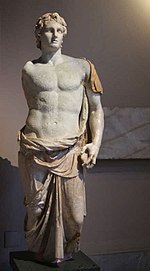In ancient times, the Greeks were exceptional soldiers and sailors. They proved this when they defeated two invasions from the vast Persian Empire. In fact, the Persian Emperor loved to hire them as mercenaries whenever he could. The only problem was that the Greeks were divided into little city-states that fought each other often. The Peloponnesian war was the greatest of these conflicts, since it was between the most powerful states of Athens and Sparta. Some of the Greeks allegedly believed that if they could somehow join into an empire they could conquer the Persians and maybe even the entire known world, which spanned Europe and upper Africa. But nobody seemed to know how. And for a long, long, long time the Greek states continued to fight among themselves until something amazing happened in 338 BC.
One man, who also wanted Greek Unity, had his own ideas. His name was Philip and he was the King of Macedon, a region just north of Greece. He would either conquer or ally himself with all the little city-states and then lead them on a war of vengeance against Persia, because the Persians had invaded Greece several times. It was difficult to vanquish the cities of Athens and Thebes, especially when the patriotic Greek Orator, Demosthenes, guided their democracy. But finally Greece was subdued. Not long after Philip conquered Greece in 338 BC he was mysteriously assassinated, although we do not know by whom. (Greece could finally rise up, fight, and conquer Persia. It was amazing that the Greek States had suddenly united together into a powerful empire, like small pebbles being turned into an unconquerable mountain.
(6) Philip died before conquering Persia. When Philip perished his young son, Alexander, took over the throne. Some of the Greeks took advantage of his age and rebelled against him. That was a bad mistake. Alexander, who was only about twenty years old, brutally dominated the rebels including those of Thebes, and even sold some of the people as slaves! After that, Greece was too afraid to rebel again so Alexander was safe to make the dream of conquering Persia a reality. Swiftly, cunningly, courageously, Alexander started his masterful campaign. Alexander conquered the entire Persian Empire including Egypt and India!
Unfortunately, Alexander died young and his generals could not decide whom to appoint the new ruler. The generals eventually divided the kingdom into what were called the “Hellenistic” (or Greek) kingdoms, each with a dynasty named after the general who controlled that kingdom. After a whole generation of warfare, three main dynasties emerged. They were the Ptolemaic Dynasty over Egypt, the Seleucid Dynasty over Syria and Mesopotamia, and the Antigenic Dynasty over Macedonia. When Alexander died the dream of Greek unity had never been so close, but also just beyond his grasp. Alexander once said “Do you not think it a matter worthy of lamentation that when there is such a vast multitude of [worlds], we have not yet conquered one?”
